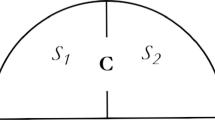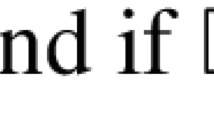Abstract
C. S. Jenkins has recently proposed an account of arithmetical knowledge designed to be realist, empiricist, and apriorist: realist in that what’s the case in arithmetic doesn’t rely on us being any particular way; empiricist in that arithmetic knowledge crucially depends on the senses; and apriorist in that it accommodates the time-honored judgment that there is something special about arithmetical knowledge, something we have historically labeled with ‘a priori’. I’m here concerned with the prospects for extending Jenkins’s account beyond arithmetic—in particular, to set theory. After setting out the central elements of Jenkins’s account and entertaining challenges to extending it to set theory, I conclude that a satisfactory such extension is unlikely.
Similar content being viewed by others
Notes
In general, the more likely it is that arithmetic alone is within the scope of an account of mathematical epistemology, the more diminished the account’s interest and importance. In this Jenkins’s account is no different from any other in the philosophy of mathematics. Witness attempts to extend Frege’s work beyond arithmetic (e.g., Fine 2002; Burgess 2005; Hale 2000; Shapiro 2000), similarly for Hellman’s modal structuralism (1989) and Kitcher’s naturalistic constructivism (1983, 1988).
See Jenkins (2005, pp. 742–743).
For more on this point, see Ronald (forthcoming)
Jenkins cites the accommodation of naturalistic concerns as a significant point in favor of her account of arithmetical knowledge. See, e.g., Jenkins (2008, p. 152).
See also Jenkins (2008, p. 152).
Jenkins sometimes treats ‘p’ as if it stands for a proposition and other times as if it stands for a fact (e.g., (2008, Chapter 4, especially §§4.1 and 4.2)). I will use ‘p’ to stand for a declarative sentence, ‘[p]’ to stand for the fact that p, and ‘that p’ to stand for the proposition expressed by p.
For those details, see Jenkins (2008, Chapter 3, especially §3.2).
I will ignore some subtleties of Jenkins’s definitions not relevant to my arguments. For details on her definitions, see Jenkins (2008, pp. 126–131, 269–271).
The quotation in this sentence is specific to arithmetic, but Jenkins’s clearly holds the same view for any concepts examination of which might yield a priori knowledge.
See Jenkins (2008, §4.5) for details on both ways of directly grounding a concept Jenkins considers.
Thanks to an anonymous referee for catching a subtle, but important, error in a previous version of this passage.
See, e.g., Jenkins (2008, p. 121).
See, e.g., Jenkins (2005, §3) for more sophisticated ways this might go.
For details on large cardinals, see Kanamori (1994).
See Boolos (1998, p. 120). The least cardinal λ such that \(\lambda=\aleph_\lambda\) is the union of \(\lbrace \aleph_0, \aleph_{\aleph_0},\) \( \aleph_{\aleph_{\aleph_0}},\dots \rbrace\).
Simply rejecting large cardinals won’t help here, since the existence of the least cardinal λ such that \(\lambda=\aleph_\lambda\) is provable in Zermelo-Fraenkel set theory with the Axiom of Choice (ZFC).
Notice that there is a certain affinity with the inconsistency of Frege’s logicism and the chief response to it here. One way of thinking about Russell’s paradox is as showing that Frege erred by not distinguishing proper classes from sets. Contemporary set theory avoids this error by restricting Comprehension. The point I’m making in the text can be taken as highlighting that the distinction between sets and proper classes which leads to this restriction cannot be acquired purely via sensory input. Rather, its source is (at least in part) theoretical in nature.
Thanks to an anonymous referee for raising this issue.
I’m not arguing that our best science can do without any concept functioning as the concept of set now does. Some such concept is arguably indispensable to our best science. Rather, I’m arguing that the concept of class could serve the function that set now does in our best science every bit as well as set.
I give an example below.
See Goldman (1976).
See Pritchard (2005).
Notice that I’m not equating a true belief’s being unsafe with its being lucky. Rather, I’m using the fact that any true unsafe belief is lucky.
It’s worth noting that Jenkins endorses the view that lucky beliefs aren’t knowledge. Indeed, the non-accidental accuracy required for groundedness of a concept is intended to mirror the non-accidental truth required for knowledge. See Jenkins (2008, p. 128.)
The indeterminacy worry I’ve raised might bring to mind referential indeterminacy of the modest (i.e., non-Quinean) sort addressed in Field (1973) and Wilson (1982), suggesting that a partial denotation-style solution to referential indeterminacy might yield a solution to the problem at hand. Assuming a simple correlation of general terms (predicates) with concepts and identifying concepts with their extensions, we might try to frame the problem at hand in terms of ‘set’ partially denoting the class of sets and partially denoting the class of classes and say that the denotation of ‘set’ was refined to just the class of sets. But since the class of sets is not disjoint from the class of classes (the former is a subclass of the latter) this doesn’t conform to the Field–Wilson partial denotation strategy of dealing with referential indeterminacy. Moreover, even if we ignore the restriction to pairwise disjoint partial extensions operative in that strategy, there is little reason to think that the reference of ‘set’ was refined purely (or even mostly) in response to sensory input. So, despite a superficial similarity, the type of referential indeterminacy which is our present concern substantially differs from that of concern to Field and Wilson. Accordingly, a partial denotation-style solution to our indeterminacy problem is implausible.
I here understand naturalism in accordance with the slogan “The epistemology of empirical science is an empirical science” (Boyd 1990, p. 366). There are, of course, other ways to understand naturalism. However, since Jenkins locates the naturalistic credentials of her view in “the only source of knowledge [being] one that relies in an essential way on the use of our familiar sensory apparatus” (Jenkins 2008, p. 152), said apparatus being as described by our best (empirical) science, my understanding is consonant with Jenkins’s own.
See Ronald (forthcoming).
See n. 4.
One might worry that the clash between the internal integrity of mathematics and revising set theory in the way just described depends on an equivocation on ‘naturalism’ that renders this problem moot. The naturalistic slogan extended to encompass mathematics is “The epistemology of science, mathematical as well as non-mathematical, is an empirical science,” and I might here appear to be sliding between understanding naturalism on one hand according to this slogan and on the other as opposition to what John Burgess and Gideon Rosen call ‘alienated’ epistemology (1997, p. 33). I actually think that these two conceptions of naturalism are closely related, so that the equivocation is merely apparent, but to directly address this issue would take us too far afield. However, given the decisiveness of the second problem, whether or not the equivocation is genuine is of little importance to the main thrust of the paper. Thanks to an anonymous referee for raising this issue.
We might try to alleviate this difficulty by introducing a distinguished predicate S into the language of set theory such that ‘Sx’ informally says that x is a set. Relativizing the axioms of ZFC to S would then do the trick; the relativization of (‡) to S would then be a theorem, not (‡) itself. The problem, of course, is that in order to help with the problem at hand the concept associated with this new predicate must be the concept of set, and it’s precisely for want of that very concept that we’ve proposed introducing the new predicate.
In addition to the problem I’m about to discuss, there might also be a problem of indeterminacy between membership and subset. I leave this issue aside.
A Lewis-style reduction of set theory to part–whole theory á la (1991) won’t help here, since such a reduction requires a primitive singleton-set operation and so assumes already concepts of both set and membership.
See Dauben (1990).
See Grattan-Guinness (1997, especially Chapter 2).
See Kripke (1982).
See Jenkins (2008, pp. 227–230).
Theories T and T′ are empirically equivalent just in case they have all and only the same observational consequences (when paired with the same set of auxiliary hypotheses). Intuitively, empirically equivalent theories are indistinguishable by experience—past, present, or future.
Cf. Kripke on simplicity and the content of hypotheses (1982, p. 38).
References
Boolos, G. (1998). Must we believe in set theory? In R. Jeffrey (Ed.), Logic, logic, and logic (pp. 120–131). Cambridge: Harvard University Press.
Boyd, R. (1980). Scientific realism and naturalistic epistemology. In Proceedings of the philosophy of science association (vol. 2, pp. 613–662). East Lansing: Philosophy of Science Association.
Boyd, R. (1990). Realism, approximate truth, and philosophical method. In C. W. Savage (Ed.), Scientific theories. Minnesota studies in the philosophy of science (vol. XIV, pp. 355–391). Minneapolis: University of Minnesota Press.
Burgess, J. P. (2005). Fixing Frege. Oxford: Oxford University Press.
Burgess, J. P., Rosen, G. (1997). A subject with no object. Oxford: Oxford University Press.
Colyvan, M. (2001). The indispensability of mathematics. Oxford: Oxford University Press.
Dauben, J. (1990). Georg Cantor: His mathematics and philosophy of the infinite. Princeton: Princeton University Press.
Field, H. (1973). Theory change and the indeterminacy of reference. Journal of Philosophy, 70, 462–481.
Fine, K. (2002). The limits of abstraction. Oxford: Oxford University Press.
Goldman, A. (1976). Discrimination and perceptual knowledge. Liasons: Philosophy meets the cognitive sciences (pp. 85–103). Cambridge: MIT.
Grattan-Guinness, I. (1997). The rainbow of mathematics: A history of the mathematical sciences. New York: W. W. Norton.
Hale, B. (2000). Reals by abstraction. Philosophia Mathematica, 8(3), 100–123.
Hellman, G. (1989). Mathematics without numbers. Oxford: Oxford University Press.
Jenkins, C. S. (2005). Knowledge of arithmetic. The British Journal for the Philosophy of Science, 56, 727–747.
Jenkins, C. S. (2008). Grounding concepts: An empirical basis for arithmetic knowledge. Oxford: Oxford University Press.
Kanamori, A. (1994). The higher infinite. Perspectives in mathematical logic. New York: Springer.
Kitcher, P. (1983). The nature of mathematical knowledge. Oxford: Oxford University Press.
Kitcher, P. (1988). Mathematical naturalism. In W. Aspray, P. Kitcher (Eds.), Essays on the history and philosophy of modern mathematics. Minnesota studies in the philosophy of science (vol. XI, pp. 293–328). Minneapolis: University of Minnesota Press.
Kripke, S. (1982). Wittgenstein on rules and private language. Cambridge: Harvard University Press.
Lewis, D. (1991). Parts of classes. New York: Wiley–Blackwell.
Pritchard, D. (2005). Epistemic luck. Oxford: Oxford University Press.
Putnam, H. (1971). Philosophy of logic. Mathematics, matter, and method (2nd edn., pp. 323–357). Cambridge: Cambridge University Press.
Putnam, H. (1975). What is mathematical truth. Mathematics, matter, and method (2nd edn., pp. 60–78). Cambridge: Cambridge University Press.
Quine, W. V. (1954). Carnap and logical truth. The ways of Paradox (revised and enlarged edn., pp. 107–132). Cambridge: Harvard University Press.
Quine, W. V. O. (1948). On what there is. From a logical point of view (2nd edn., pp. 1–19). New York: Harper & Row.
Roland, J. W. (forthcoming). On naturalizing the epistemology of mathematics. Pacific Philosophical Quarterly.
Shapiro, S. (2000). Frege meets Dedekind: A neo-logicist treatment of real analysis. Notre Dame Journal of Formal Logic, 41, 335–364.
Wilson, M. (1982). Predicate meets property. Phiosophical Review, 91(4), 549–589.
Zermelo, E. (1908/1967). Investigations in the foundations of set theory I. In J. van Heijenoort (Ed.), From Frege to Gödel (pp. 199–215). Cambridge: Harvard University Press.
Acknowledgements
Thanks to Jon Cogburn and two anonymous referees for valuable discussion and comments. Thanks also to the Department of Philosophy at The College of William and Mary, where I presented the penultimate version of this paper.
Author information
Authors and Affiliations
Corresponding author
Rights and permissions
About this article
Cite this article
Roland, J.W. Concept Grounding and Knowledge of Set Theory. Philosophia 38, 179–193 (2010). https://doi.org/10.1007/s11406-009-9186-4
Received:
Revised:
Accepted:
Published:
Issue Date:
DOI: https://doi.org/10.1007/s11406-009-9186-4




